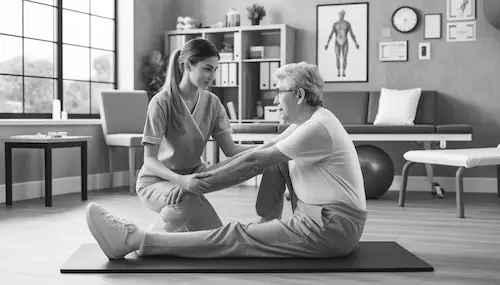As our loved ones grow older, they deserve care, respect, and attention that matches their needs. Aging is a natural process, but it often brings a set of health challenges known as geriatric problems. These issues can affect mobility, memory, emotions, and the overall quality of life.
At The Physionic, we understand that every senior deserves compassionate, personalized medical care. Whether you’re caring for your parents, grandparents, or yourself, this guide will help you better understand common geriatric issues and how to manage them.
👉 Book a Geriatric Consultation at The Physionic – compassionate care, one appointment away.
What Are Geriatric Problems?
Geriatric problems refer to the medical, physical, and mental health concerns that affect older adults—typically those over 60. Unlike younger people, seniors often face multiple health conditions at the same time, which require a more holistic and gentle approach to treatment.
These problems can be physical (like arthritis), cognitive (like dementia), or emotional (like depression and loneliness). And because aging bodies respond differently to medication and stress, specialized care becomes essential.
Common Health Problems in the Elderly
Let’s look at some of the most frequently seen health issues in seniors:
🦴 1. Joint Pain and Arthritis
Aches in the knees, hips, and hands are common as cartilage wears down. Arthritis makes daily tasks harder, leading to frustration and less mobility.
🔍 Did You Know? Arthritis affects over 50% of people over 65.
2. Memory Loss and Dementia
Forgetfulness can be normal with age—but when it becomes more frequent or affects everyday life, conditions like Alzheimer’s disease may be the cause.
⚠️ Signs to watch: confusion, repeating questions, or getting lost.
❤️ 3. Heart Problems
Heart diseases like high blood pressure, heart failure, and strokes are major concerns in older adults. These require regular monitoring and lifestyle changes.
🍬 4. Diabetes
Type 2 diabetes is common in the elderly and can silently damage the kidneys, eyes, and nerves if not controlled.
👁️ 5. Hearing and Vision Loss
Gradual loss of hearing or blurred vision can make seniors feel isolated or unsafe. Timely check-ups and devices (like glasses or hearing aids) can help.
🧍 6. Falls and Mobility Issues
Falls are a leading cause of injury among the elderly. Weak muscles, poor balance, or medications can all contribute.
😔 7. Depression and Loneliness
Many seniors feel emotionally alone, especially after retirement, losing a spouse, or living away from family. Emotional well-being is just as important as physical health.
Why Specialized Geriatric Care Matters
Older adults are not just adults with gray hair—their bodies work differently. They need:
- Fewer or adjusted medications
- Attention to emotional health
- Nutritional care
- Fall prevention
- Respectful, patient communication
That’s where we come in.
💙 At The Physionic, we offer:
Comprehensive geriatric health assessments
Personalized treatment plans
Physical therapy and rehabilitation
Mental health support
Ongoing follow-ups to prevent complications
👉 Schedule an appointment now to give your loved one the care they truly deserve.
Tips to Keep Seniors Healthy at Home
Taking care of elders doesn’t always need hospitals. Here’s how you can support them at home:
- 🥦 Cook light, nutritious meals with less salt and oil
- 🚶 Encourage gentle walks or stretching exercises
- 💊 Help with medication schedules and doctor visits
- 📞 Call regularly if they live alone
- 📺 Involve them in hobbies, board games, or gardening
- 🪑 Remove trip hazards like rugs or wet floors to prevent falls
When to See a Doctor
If your loved one is:
- Frequently forgetting things
- Losing weight unintentionally
- Feeling dizzy or falling often
- Feeling sad or hopeless for long periods
- Having pain that won’t go away
👉 Don’t wait. at The Physionic. We listen, we care, and we help.
| Learn more about Alzheimer’s disease |

